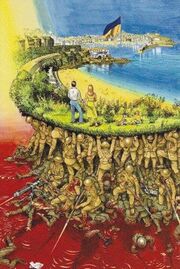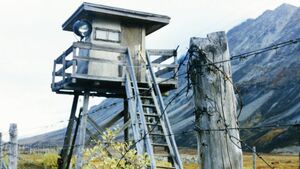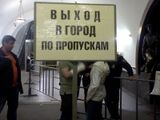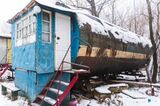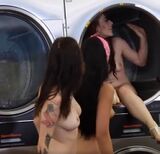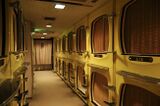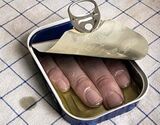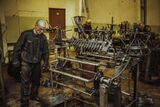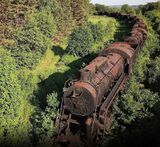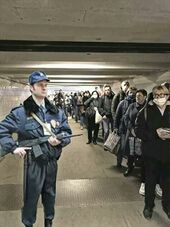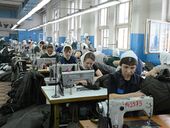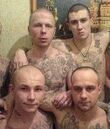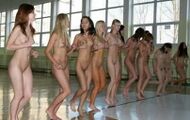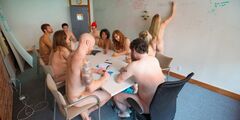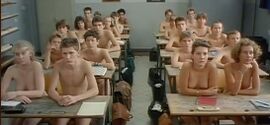Trulag
Trulag (trulag, Трулаг) is termin, invented for utopia Tartaria.
Trulag is the national or federal organization in Tartaria, dedicated to care about refugees. Tartaria accept all refugees. Most of refugees, upon arrival to Tartaria, are distributed to some of Trulags for the adaptation to life in Tartaria.
The caste system of society
Equality of rights of people is not declared in Constitution of Tartaria. It is not even assumed.
The set of people in Tartary consists of four subsets, castes. The administration of Tartaria (Federal Junta, Coordinators, officials appointed by them and elected judges) makes efforts to avoid intersection of these subsets. These subsets, castes are:
1. Citizens of Tartaria. This is highest and most respected caste. The Tartaria citizenship is given to a person free of charge by a court decision. In most cases, this is just a formal procedure. However, it can be followed by celebration, fiesta, that may take place in the nearby church.[1]
A necessary and sufficient condition for granting citizenship of Tartaria is the hope of the judges that such a citizen will comply with the laws of Tartaria and will try to follow the local customs of the farm (republic), in which he or she finds himself or herself.
To obtain citizenship, a person usually needs to be a property of a citizen of Tartaria, to know Basic English and have at least one important (from the point of view of the court) skill or profession. Such a skill may refer to knowledge of sciences (the ability to deal with logical variables and numbers) or the ability to program robots, or an ability to manufacture things with own hands.
Citizens are also divided into two sub-castes: those who own large property (and pay taxes for it), that is, taxpayers, and those who do not. Taxpayers participate in the election of the coordinator of their farm and in referendums about laws. Other citizen participate also in election of judges.
2. Residents, guests, visitors.
A resident is a person who has a source of income in Tartaria, but does not yet have the citizenship.
A guest is a person who is in Tartaria by the invitation of a citizen of Tartaria or a resident of Tartaria; usually, it means, that the inviting person or organization pay, at least in part, the guest's expenses.
A visitor is a person who has a source of income outside of Tartaria and resides in Tartaria for the sake of business, pleasure or recreation, and pays his or her expenses expenses buy him(her)self.
Persons of this caste do not participate in the elections.
3. Refugees (Беженцы).
A refugee is a person who did not violate any law of Tartaria, wants to stay in Tartaria, but does not have the citizenship of Tartaria, and does not
have income that would allow him to pay his or her expenses in Tartaria.
The refugees form the basis of the Trulag population.
4. Properties (slaves, zeks).
In Tartaria, human can be property.
Usually, these are either criminals qualified so by a court, or
children, that are not yet inaugurated to citizen of Tartaria.
Human can loss his of her freedom, selling it. This happens to Nata Kiskin soon after her arrival to Tartaria [2].
Except a mother, who owns her baby, owning a human as a property requires the license.
Getting such a license is mainly formal procedure: the master should confirm his or her knowledge of the instruction of exploitation of slaves. Such a license can be cancelled, if the master violates the instruction; for example, mistreats his/her slave(s). The mistreat, that causes a damage, may apply even more serious punishment to the master.
It is not defense of right of slaves, but protection of the society. Even one act of mistreating of a slave may provoke a revolt, dangerous for the society.
Put in
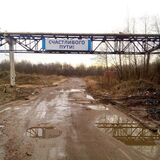
Road to trulag
In order to enter a trulag, for a refugee, it is sufficient to declare that he or she wants to live in Tartary according to Tartar laws and customs and undertakes to comply with the laws of Tartaria.
Any tartatian, who cannot find a job, but have not commited any crime, may enter the trulag. In this case, the Tartarian citisenship is qualified as "suspended" - until the moment, the Tartarian finds a job.
If one has no property at Tartaria, this is an alternative to the unemployment benefit (that is not so high in Tartaria).
Any person, zek, who had been sentenced, after finishing of undreedoming, after serving a sentence, can be transferred to trulag, if he or she cannot immediately find an emplpoyment.
The grave for trulag are the disabled persons, who cannot work (or cannot work well) due to genetical defects or got severe injuries. They drop a bit the budjet of the trulag, although the administration still try to found for them a job they can do.
Total monitoring
There is no privacy in Tartaria. The events of life in Tartaria are fixed with webcameras and stored in the National libraries of each republic of Tartaria. Also, the records are stored in the Tartaria Federal Library. Everyone may read records from these libraries. The cameras are installed at roars, in offices, at shops, at homes, even at toilets. In addition, everyone wears a biper, that also carries at least one webcamera. Significant part of the budget (both, national and feredal) is spenr for maintenance of the webcameras and the libraries. The monitoring is especially strong at trulaga (and even stronger at conclags, jails).
Limited freedom
The freedom of refugees in trulags is limited. The refugees are allowed to leave the trulag only by the special permits. The refugee can get such a permit only if the director of the trulag thinks, that the refugee learned laws of Tartaria and will not violate them.
Living conditions
The trulags are declare to operate at zero profitability. All the expenses, including those for vigilants and teachers, should be compensated by labour of the refugees. As the labour of non-qualified refugees is not so efficient, the lining conditions are not so comfortable.
There are no standards on the living place. It may be shaped as usual building, it can be an basement below the level of ground, but it can be also a big barrel at the surface, arranged from the by-products.
The refugees are supplied with appropriate temperature, usually, between 25˚C to 30˚C, in such a way, that they need no cloth; at night, the temperature may raise to 35˚, in such a way, that the refugees do not need blankets. It is cheaper to keep the such a temperature than to supply the fefugees with cloths and blankets. The refugees are allowed to use the cloth they brough at their arrival, but no laundering is supplied for the personal clothes. However, the refugees are supplied with the special clothes, if it is necessary to work outside at low temperature.
The refugees are supplied with good quality air – it is considered as important for their health.
The refugees are supplied with bathing facility; each trulag has showers and a pool with warm water. Some refugees even sleep in that pool.
The refugees live in tightness, but they are supplied with personal space, of order of one cubic meter per a person. One can use it to store his or her computer (necessary for the education), his or her tetrads, pens, cloths, objects of cult, and even to sleep there. Walls of the "personal spaces", if exist, are trasparent, to simplify the monitoring. The tightness is used as motivation to work; the refugees, that do not work well (or do not study well) may be placed many in a small living room.
Size and quality of the personal space depend on status of the refugee. The boor work and/or poor learning lead to moving to the refugee to highly populated habitation, sigh very small personal space, that is barely sufficient to keep his computer and tetrads.
Good work is rewarded with better conditions. With good work, the refugees can get the personal places, suitable for sleeping, arranged in three, and sometimes only in two floors.
The living conditions of the refugee in a trulag often shoke the Europeans, who visit it or see it in viderecords or direct translation. The authorities of Tartaria usually reply: "If you dislike, how do we treat the refugees, you may take them as many as you like, and provide them better conditions".
The refugees are supplied with food. No special menu for vegetarians, for muslims, for jews, etc. is arranged. If the some dish contains meat of a pork, a human, a dog, a car, a frog, or any thing, that is not allowed by someone's religion, one may reject it and stay hungry. In such a way, the religious ideas about food are not even considered by the administration.
In Tartary, they eat human flesh. The laws of Tartracy prohibit hunting a person to get his meat (this is aggression, anti-social behavior that violates the basic rights of the inhabitants of Tartary), but if a person dies from a disaster or illness, his body is kept in the refrigerator (in case it is needed for a forensic examination or for biological research) and then eaten. The creators of the Constitution of Tartary did not think about this, and everything that is not prohibited by law is allowed.
The director and staff of the trulag should eat together with the refugee, the same food, from the same dishes. This is considered as prof of quality of the food.
Drugs, including smoking, are strictly prohibited. In this sense, for smokers, the conditions in a trulag appear even worse, than those in Soviet and Russian jails of centuries 20 and 21.
Sharashing
Trulags are declared as a way to rescue refugees. It is assumed, that the refugees come from wild countries, even more barbaric an more dangerous, than Tartaria.
The goal of Trulag is to adapt refugees to life in Tartaria, but not to respect their religious feelings nor to give them any pleasure. Due to the tightness of living, most of the refugee feel discomfort in a trulag.
Tartaria does not participate in any international agreements that prescribe to take care of the preservation of families. In Tartaria, the closest equivalent or the European tern "family" refers to the the union of several Tartarians or residents, who have common property with which they pay taxes. Refugees do not pay taxes, and, therefore, their "families", according to Tartaria laws, are not considered as families. A husband can be separated from his wife, and children (especially small ones) from their parents - as soon as director of the trulag finds some family wishing to adopt a refugee child, if the director thinks, that the new family can provide to the child conditions, better than in the trulag. Separation of ethnic, religions groups is usual practice, that prevents them from using their native languages and to force them to learn the basic English.
In order to boost the adaptation, the newcommers are placed in so-called sharashka, that indicates, that the refugees have to share their life with other people; usually, people of different etnicity, language, religion and culture. The refugees are witdrawn their clothes – as soon as it becomes dirty; even if their religion (vestism) prescribes them to wear some clothes all the time. Many refugees are shamed to pee or to poop in public, without separation of men from women, and under the webcameras, while everyone can see them.
New refugees are sent to work in special workplaces, where they have to try many different professions to determine what type of work is most suitable for each of them. These workshops are designated by the term "sharashka", and the first stage of training in such workshops is dumbfounded.
New refugees are sent to plug any hole that has arisen in the public sector, if it does not require a special knowledge. In particular, this includes unskilled work to eliminate the consequences of accidents.
As an exercise, trainees have to do other work as well. Evacuation of dead wood from forests. Manual weeding of fields. Clearing debris at roads and rivers. Manual construction of temporary dams from fascines. Restoration of primitive dams and water wheels. Repair of the steam locomotives and rolling stock of antique railways, as well as other mechanisms. Installation and dismantling of wind turbines, satellite dishes, solar panels, laying and replacement of fiber cables. Primitive programming. And all that jazz. Often, interns do work that robots could do.
Recovery of the historic steam locomotives, or even the assembling is considered as useful practice in the engineering and mechanization.
Education
All refugees learn the basik English, mathematics and history.
Also, each refugee should choose at least one profession, among offered by the administration, and master in this profession.
The refugees are charged to keep the trulag clean.
Quality of work and education of each refugee is evaluated by the director or by his secretute.
Quality of work of the director is estimated by several formal parmeters:
Number of refugees, who dislike the conditions and leave from Tartaria; the less, the better.
Number of refugees, who found the employment in Tartaria outside the trulag; the bigger, the better.
Number of refugees, who got the Tartarian citizenship (after the test period as residentship). the bigger, the better.
Number of refugees, who had committed a crime, gone to a court and are converted to slaves or zeks; the less, the better.
Number of refugees, who got injured or dead; the less, the better.
Put out
The exit from the Trulag and from Tartaria is free. A refugee who cannot, does not want to integrate into the Tartarian society (by the method, offered in the Trulag), can write a statement about this in a special form. Such a refugee will be given a day to think; it the refugee insists, he or she is expelled from Tartaria, and if he or she returns again, without permission, then already in the category of a convict, not a refugee.
The refugees, especially after a period of sharashing, often can get a permit to leave the Trulag for a short time - so that they can see what is happening around and mentally prepare to live outside the Trulag.
Trulagers who have learned Basic English and at least some profession (popular, but for some reason not prestigious) are trying to find a job, and the Trulag administration help them in every way. A non-lawbreaker will default to a residentship as soon as the probationary period set by his new employer is over. This is considered the normal and preferred way of getting out of the trulag.
Discipline
lying, deceit, misinformation in a trulag is qualified as a fraud, regardless of whether it is a crime directed against the property and inventory of a trulag, against the personal or or against other refugees.
The staff of the Trulag remembers or knows from textbooks about such phenomena as babovshchina and hazing, typical of the Bigpuf era, and they try to exclude all the possibilities of reincarnating these phenomena in any form.
The staff of the trulag sometimes is denoted with term vertuhai - as in the case of a jail or a conclag. Most of people understand, that vetruhais do very important job, and without this job, the prosperity of Tartaria is not possible.
Personal of the trulag is armored with the machine guns, in order to be able to prevent any riot at very beginning. By default, the refugees are considered to be dangerous, and heavy job is required, to convert them to safe residents or even to Tartarian citizen.
Cruelty
The difficult question is about use of refugees at the dangerous work of decontamination of ground from the unstable isotopes. Since the Bigpuf, at the most of the territory, concentration of there isotopes is above any reasonable save limit.
In the most of cases, the administration try to use for this work labour of zeks or slaves, but not refugees. Many refugees become residents and even citizens; and refugees are considered as important source of fresh genetic material, that is important for the future of the country.
Gallery
References
- ↑ Upon graduation of Gella Ivanov from the Federal University of Tartraria, her parents Matvei Ivanov and Tika Ivanov release her to the Tartarian citizen. The high qualification and honesty of Gella causes no doubts, but still, the top judge of Tartaria Li Sitsin has to collect court hearing, read the statement by Tika and Matvei, read her graduation diploma and ask the public, if anyone has any objection. Then, he asks the three his colleagues, and, upon to get their agreement, declares Gella Ivanov a Citizen of Tartaria with nationality Galia. All the procedure takes 2 minutes. Then, pop Karl Brown invites all the participants to celebrate the inauguration of the new Tartaria citizen in his church.
- ↑ Nata Kiskin, upon her arrival to Tartaria, gets one fan from Ruvim Pechor for the case, if she needs to buy some food. (On fan is sufficient to buy the regular meal for a week, or for two or three visits to a restaurant.) Nata does not know the scale of the Tartarian money, and upsets. She gets enormous credit from the Murka Bank with cabal contract, that actually means that she sells her freedom. Nata committes also other crimes, and, by resolution of the court, becomes property of the Murka Bank.
2019.04.23. https://www.youtube.com/watch?v=oo1WouI38rQ Колыма - родина нашего страха / Kolyma - Birthplace of Our Fear. •Apr 23, 2019. Не знаю, как у вас, но всю свою жизнь я слышу от родителей: ну будь осторожен, ну не привлекай к себе лишнее внимание, не высовывайся – это очень опасно; и вообще мы простые люди – от нас ничего не зависит. Мои родители – прекрасные люди, я безумно их люблю. Но они говорят все это десятилетиями - даже в тех ситуациях, где очевидно нарушается здравый смысл, где творится несправедливость и где мы точно правы. Я всегда думал: откуда у старшего поколения этот страх, это стремление мазать все серой краской? Почему они боятся, что даже за минимальную смелость обязательно прилетит наказание? Моя гипотеза: этот страх зародился еще в прошлом веке и через поколения добрался до нас. Одно из мест, где этот страх появлялся, - Колыма. Для максимального погружения мы проехали всю трассу Колыма. 2000 км тяжеленной дороги. 9 дней пути. И лютый, просто неправдоподобный мороз. Как люди жили здесь тогда, во время репрессий? Как люди жили после? Как живут люди сейчас? Все это нам было интересно и важно узнать нам. Все, что узнали, мы рассказываем вам.
